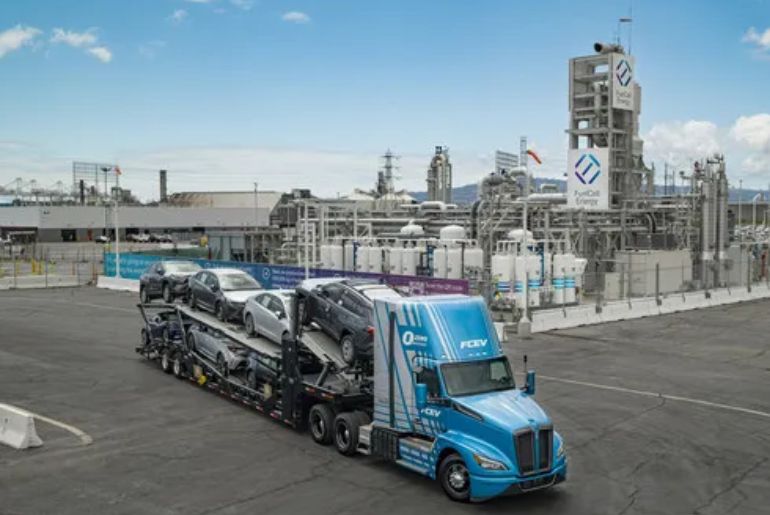Toyota Motor and FuelCell Energy celebrated the groundbreaking “Tri-gen” system at the Port of Long Beach. The Tri-gen system is a ground-breaking collaboration between the two titans of the industry and represents a significant breakthrough in renewable energy technology.
The Tri-gen system is an example of sustainable innovation in action. It is made to use biogas to produce renewable power, hydrogen, and usable water all at the same time. Built to support Toyota Logistics Services (TLS) Long Beach vehicle processing and distribution centre, this state-of-the-art building is set to transform Toyota’s largest vehicle processing facility in North America.
“The goal of our collaboration with FuelCell Energy was to find sustainable solutions for the TLS vehicle processing facility here at the Port of Long Beach as part of our goal to remove carbon dioxide emissions from our operations,” remarked Tom Stricker, Group Vice President of Sustainability and Regulatory Affairs at Toyota. “This groundbreaking facility shows that there are ways to reduce our emissions and burden on natural resources with scalable technology based on hydrogen.”
FuelCell Energy’s Tri-gen platform heralds a new era of renewable energy utilization at TLS Long Beach, with the facility now powered entirely by on-site generated renewable electricity. Utilizing innovative fuel cell technology, the Tri-gen system converts renewable biogas into electricity, hydrogen, and usable water through a highly efficient, combustion-free process that emits virtually no air pollutants.
“Tri-gen demonstrates that hydrogen-based energy can benefit businesses, deliver zero-emission transportation for light- and heavy-duty vehicles, support improved air quality in local communities, reduce water usage, and deliver immediate and long-term benefits to the environment,” stated Jason Few, CEO and President of FuelCell Energy. “As a company, we are living our purpose when we enable visionary customers like Toyota to decarbonize their operations and harness the energy solutions offered by hydrogen—all while leaving communities with cleaner air and easing the strain on power grids and water supplies.”
The Tri-gen system boasts a production capacity of 2.3 megawatts of renewable electricity, a portion of which will power TLS Long Beach’s operations at the port. Excess electricity is seamlessly integrated into the local utility grid, enhancing resilience and affordability under the California Bioenergy Market Adjustment Tariff (BioMAT) program.
Moreover, the Tri-gen system has the capability to produce up to 1,200 kg/day of hydrogen, catering to the fueling needs of Toyota’s incoming light-duty fuel cell electric vehicle (FCEV) Mirai and supporting heavy-duty hydrogen refuelling operations at the port. With California’s stringent emissions regulations mandating zero-emission trucks for drayage operations, the Tri-gen platform emerges as a pivotal enabler for the transition to cleaner transportation solutions.
The water byproduct of hydrogen generation further contributes to sustainability efforts, producing up to 1,400 gallons of usable water per day. Repurposed for TLS car wash operations, this initiative reduces demand on local water supplies by approximately half a million gallons annually.

